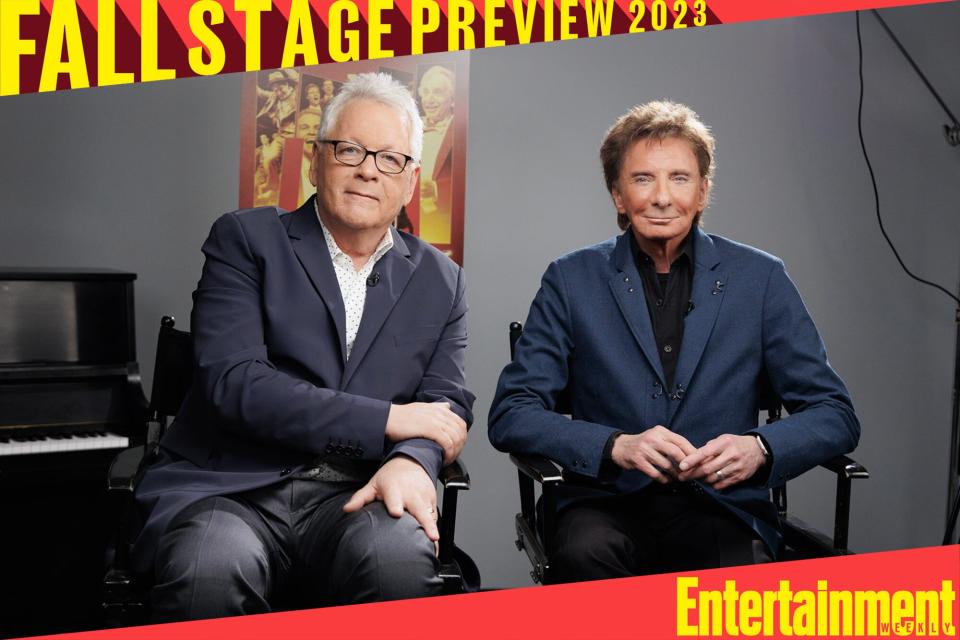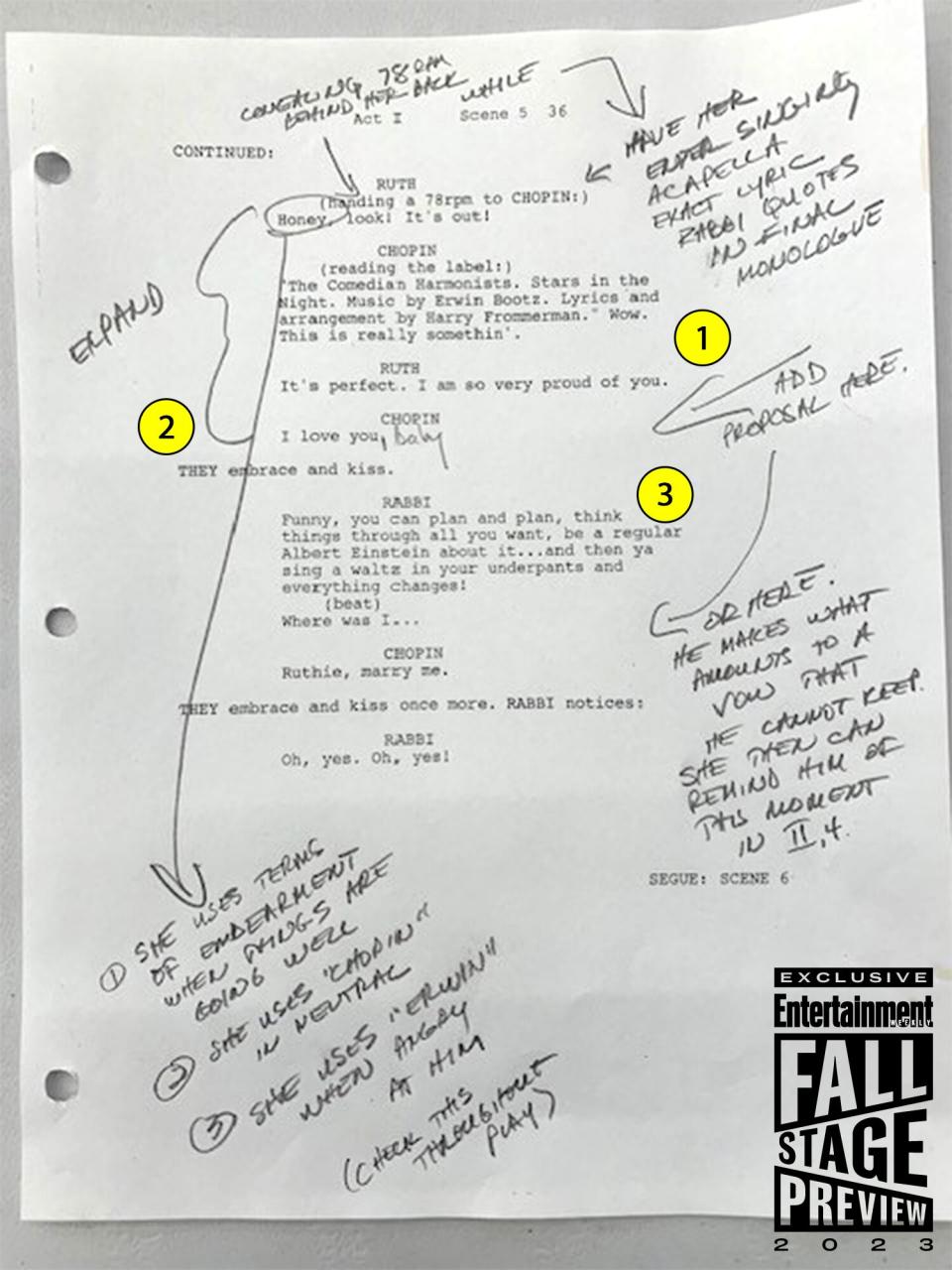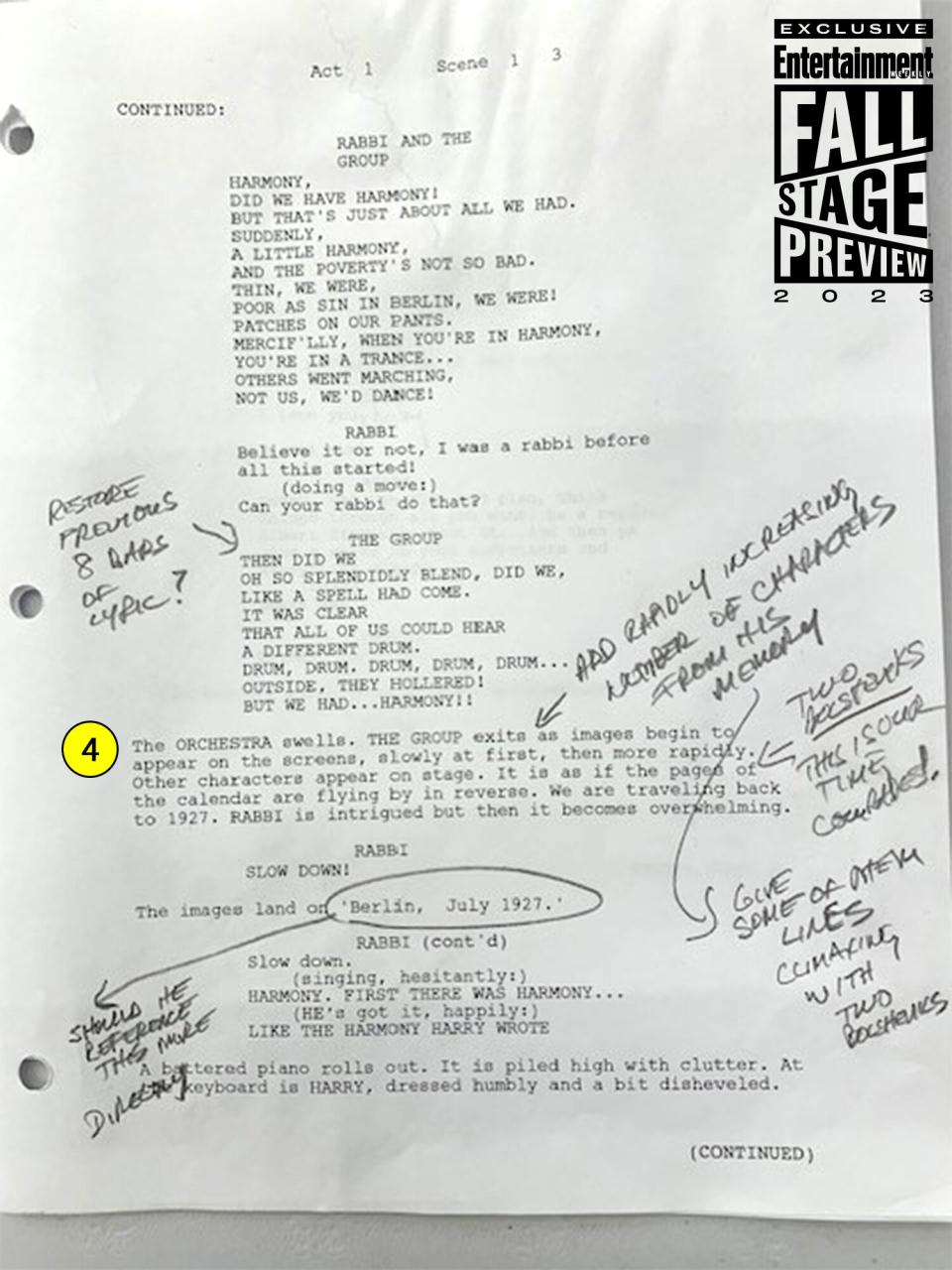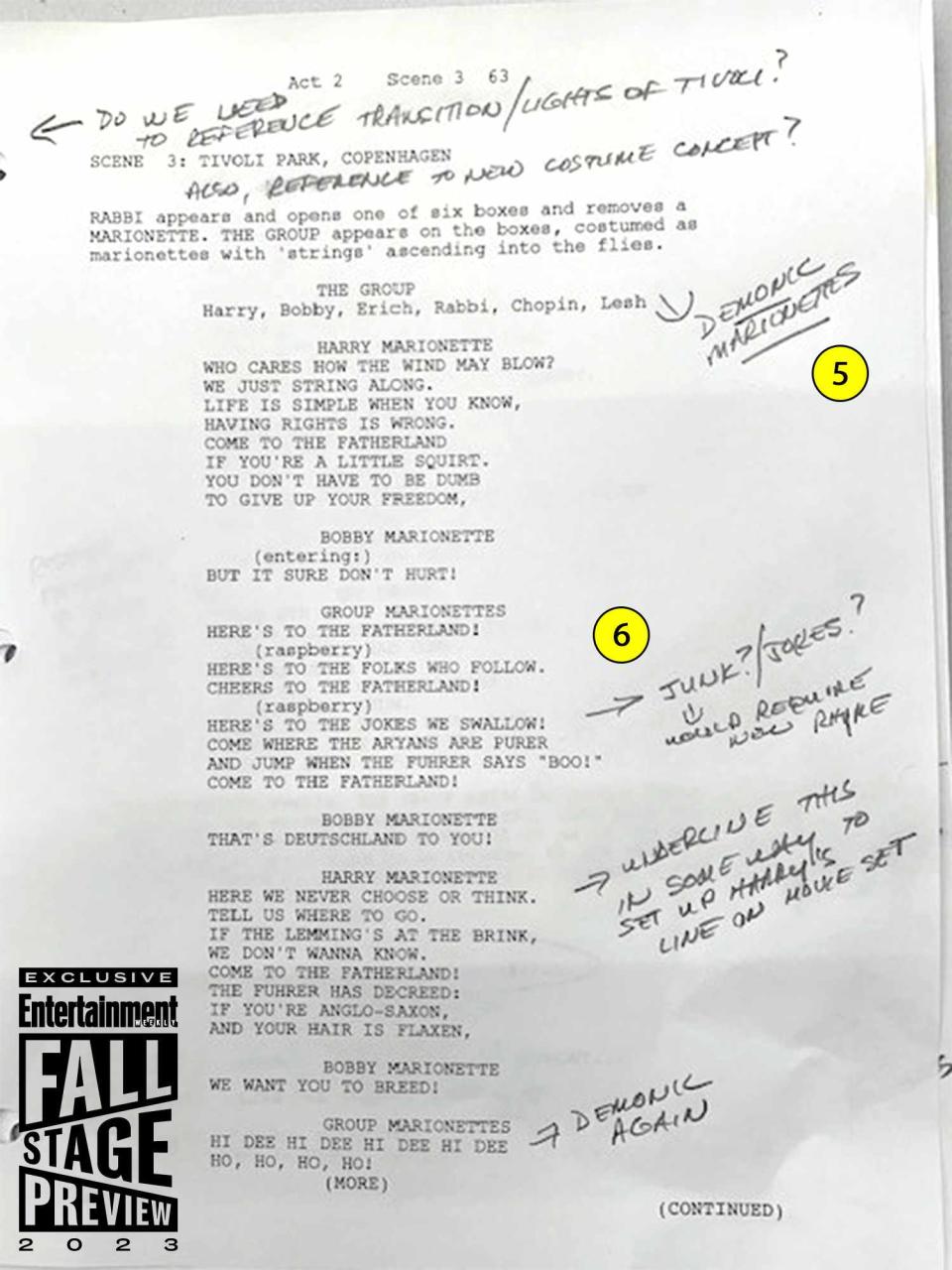Barry Manilow has spent his career wanting to write musicals — with “Harmony”, it's finally happening
- Oops!Something went wrong.Please try again later.
- Oops!Something went wrong.Please try again later.
Barry Manilow never wanted to be a pop star. His first and deepest love is musical theater (he even studied at Juillard). But after working as a musical director and arranger and accompanist, he fell into the singing career that has nabbed him Grammy Awards, Top 40 singles, and over a dozen platinum albums.
But now, at 80 years old, he and longtime writing partner Bruce Sussman, 74, are finally making their dream come true with Harmony, a stage musical that tells the true story of the Comedian Harmonists. The Harmonists were an ensemble comprised of six young men who rose to fame in in 1920s Germany with their blend of harmonies and comedic stylings — but their inclusion of Jewish singers ultimately led them to be erased from the history books.
Manilow's first major professional gig was writing the score for the Off-Broadway musical The Drunkard, and he tells EW that not much has changed in the essence of songwriting for the stage since 1964 (Harmony is no jukebox musical of Manilow's greatest hits, but an original composition). "The rules are still the same and the joy is still the same," he says. "For me, this pop career was a big surprise. I had to learn how to write a pop song. I had to learn how to make a pop record. But my goal when I was younger was to be a Broadway composer, and that's why it feels so good to see my name on the marquis that says 'Music by Barry Manilow.' That's a really big moment for me."
Manilow also dragged writing partner Sussman along into the pop music business.
"The problem with people like Bruce and I who like writing songs that are about something is that you can't do that in a pop song," reflects Manilow. "All you got in a pop song is, 'I love you or I miss you.' And if you go any further than that, you're not writing a pop song, you're writing a Broadway or a film song."

Paul Aphisit Bruce Sussman and Barry Manilow
When Harmony opens Nov. 13 at the Ethel Barrymore Theatre on Broadway, it will represent over 20 years of effort from Manilow and Sussman. The musical first premiered in San Diego, CA in 1997 — and the duo have been trying to get it to the Great White Way ever since.
After dreaming about it for years, the pair decided to make a go of writing a musical after collaborating on the scores for animated films Thumbelina (1994) and The Pebble and The Penguin (1995). "The classic animated films follow the Rodgers and Hammerstein formula for writing a musical," says Sussman. "So when we had a chance to do that, it was time to roll up our sleeves. If anything that lit the fire in both of us to say, 'Listen, we've got to get back to the stage because that was such a joyful experience.' It was right around that time that we really committed to writing Harmony."
Sussman first discovered the story of the Comedian Harmonists from a New York Times review of a 1977 German documentary The Comedian Harmonists, which was playing at the Public Theatre. "The review was really compelling and it featured a photograph of six young guys with their hair brill-creamed," Sussman remembers. He went to see the 191-minute film and was blown away. "I was gobsmacked and went to a phone booth on Lafayette Street and called Barry and said, 'I think I found it. I think I found the story.'"
Manilow agreed it was a subject ripe for their exploration, and the two immediately set to work, leading to their first opening night in 1997. Harmony was meant to have a Broadway opening in 2003, but the production fell apart due to lack of funding. In 2004, Manilow released an album where he recorded all of the songs from the show himself. Finally, it ran in Atlanta and Los Angeles in 2013 and 2014, before it made a 2022 Off-Broadway premiere.
Sussman says it was the COVID-19 pandemic that really led him and Manilow to revisit their dream. "During the pandemic, we had all that time off, and Barry and [director] Warren Carlyle and I Zoomed twice a week," he notes. "We said as long as we have this down time, why don't we kick the tires and see if there's something else we want to do. Over the course of a couple months, we came up with a big idea that changed a lot."
Sharing pages from the draft of the script prior to the current iteration, Sussman and Manilow break down a key scene from early in the musical.



1. A Proposal
In this draft, Sussman was trying to determine whether he should insert a marriage proposal from Chopin (Blake Roman) to Ruth (Julie Benko) before or after Rabbi's narration. "The proposal is in, and we love it," Sussman says. "There were two spots that I was considering, and I put it in the later moment. We staged it a few days ago and I like it a lot."
2. Terms of Endearment
While Chopin calls Ruth "baby," she has many names for him throughout the show, including Honey, Chopin, and his real name, Erwin.
"Chopin is a nickname because he actually was called that when he was playing piano in a brothel," Sussman explains. "And one of the ladies who made her career there called him Chopin because she thought he played so beautifully and he loved it because he hated his real name, which was Erwin. So it occurred to me that his girl, his girlfriend and eventual wife, would call him Erwin when she was angry at him because she knew he hated it. She'd call him Chopin by default, like 'Chopin here, help me get this off the shelf,' and then call him something, a term of endearment, baby, honey, whatever, when things were good. I realized that I could use that to clock where they were in their relationship."
3. From a certain point of view
The play has the framing device of a narrator, the character known as Rabbi. But his role changed significantly in the new drafts the team worked out during the COVID-19 shutdown. "We looked at the two drafts and decided which one we were going to do and we picked the one that had the big change," says Sussman. "There was always narration, but originally we had him as a young lad who reveals himself to be an old man at the end of the play. Now, there are two of them now — an older and younger."
The older Rabbi is played by Chip Zien, who serves as narrator throughout the show, while Danny Kornfeld plays the younger Rabbi in the thick of the action.
4. Time travel
Accompanied by a swelling orchestra, Rabbi's narration carries us back into his memories of 1927 Berlin. Sussman had to figure out a way to translate this into staging, and even added dialogue to make it clear. "That whole transition, which used to be only visual images now is populated with our ensemble," he explains. "It's in Rabbi's mind, and all of the characters we will eventually meet flood in. He has to gain control over his memory and slow down, one at a time. That was a big, big collaboration between both my director and Barry with the music for that section, and me, where I provided lines for some of these characters."
On the next page, Sussman makes note of a similar issue, wanting to convey the setting of Tivoli Gardens to the audience. "One of the wonderful things about Tivoli Park is that it's architecture built of light bulbs," he says. "I didn't feel an American audience would necessarily know that. My director picked up the ball with that, and we now have a transition that establishes all of that choreographically. So, I didn't have to write anything."
5. The sign of the beast
In the number, "Come to the Fatherland," the Harmonists appear as "demonic marionettes," according to Sussman's penciled-in note. "That number goes way back," he explains. "It was one of the earliest pieces we wrote. The guy who sings the lead on this one, Zal Owen, he can do demonic marionette better than anyone ever. I just realized that's the key to this number — they have to really be menacing, demonic marionettes."
For musical theater fans who see the words "Fatherland" and immediately think of Cabaret, Sussman and Manilow stress that Harmony doesn't draw inspiration from Cabaret despite a similar setting. "I can't say this score has a sound to it because the Harmonists didn't have one sound," Manilow says.
"This group sang in so many different styles," adds Sussman. "We listened very carefully to a number they did called 'The Puppet Show.' I forget how to say that in German, but it was puppet show and it was a jaunty gallop. We got the idea for what 'Come to the Fatherland' could be from that."
6. Finding the right word
Here, Sussman pondered swapping "jokes" in the lyric "Here's to the jokes we swallow" with "junk." His notes point out that this would require a new rhyme with "folks" in the lyrics above. Sussman says he ended up leaving it as is with the word "jokes."
"I decided it's stronger this way," he notes.
Harmony begins preview performances on Oct. 18 and Sussman and Manilow hope that audiences will take the story of the Comedian Harmonists home with them.
"Our goal was to make sure that the audiences walk away knowing who these men are," reflects Manilow. "They were erased from the world. And when we discovered them, we said, 'Who are these people and why don't we know about them?'"
Adds Sussman: "The history we ignore is the history we're condemned to repeat."
Related content:
Josh Gad and Andrew Rannells are back on stage together in Gutenberg, just don't call it a reunion
Betty Who is in hell — well, Hadestown: The pop star's Broadway debut is a 'full-circle moment'
Leslie Odom Jr. has been trying to get Purlie Victorious to Broadway for six years

